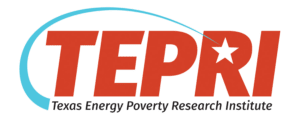
Friends of TEPRI,
With great pleasure we present our 2023 Outlook. Our robust portfolio of 2023 projects represent an array of promising pathways to advance affordable, reliable, and clean energy for households with lower incomes. Over the next decade, we are working to create an energy landscape that includes better access to energy efficiency programs, affordable solar solutions, and new energy technologies for all. The energy opportunity is dynamic, and we are excited to be developing solutions that will prepare Texas for an inclusive and sustainable energy future!
Warmly,

Margo Weisz, Executive Director
TEPRI 2023 OUTLOOK

Our work is grounded by the interests and priorities of the people we serve. TEPRI’s research agenda aims to better understand the concerns, challenges, and experience of people whose incomes put them at risk of not meeting their basic energy needs. We are gathering data through comprehensive surveying of households, by conducting focus groups, and through data sharing to expand our collective understanding of low-income communities and their relationships with energy.
- Community Voices in Energy Survey: Through a statewide survey, we aim to understand the experiences and priorities of people with lower incomes. Using our comprehensive survey responses, data on demographics and energy, and heat maps to identify areas with high energy burdens, we will produce 13 regional reports and a statewide summary report that highlight the priorities and unique challenges of each geographic area around affordable, reliable, and clean energy for lower-income households.
- Low Income Community Solar Evaluation: Partnering with Big Sun Solar, TEPRI is working to evaluate the experience of solar assistance program participants who are a part of an innovative community solar program in San Antonio. Our aim is to inform future program design, capture participant experience, and measure noteworthy outcomes.

TEPRI’s research informs our development of innovative models that test scalable solutions for providing affordable, reliable, and clean energy for households with lower incomes.
Affordable Solar Models
- TEPRI is helping address solar cost and financing barriers by installing solar on manufactured, modular homes designed for low-income families in the Brownsville area. Working with ‘come dream. come build’ in Brownsville, we are testing how we can drive down the cost of solar in modular homes by streamlining the installation process during the manufacturing stage, evaluating the bill savings compared to costs, and rolling the expense into the mortgage.
- TEPRI is leading a team to expand the uses of federal Weatherization Assistance Program (WAP) and Low-Income Home Energy Assistance Program (LIHEAP) dollars for residential solar. With the substantial increase in federal resources, some homes are good candidates for utilizing solar to reduce energy bills and access renewable energy. The multi-stakeholder team, which includes the Houston Advanced Research Center (HARC), Frontier Energy, Texas Solar Energy Society, AEP Texas, the Austin Area Urban League, and the Community Services Agency of South Texas aims to unlock solar as a competitive option within government programs to advance more equitable distribution of rooftop solar.
Virtual Power Plants (VPPs)
- TEPRI is partnering with PearlX to deploy virtual power plant technology on affordable multi-family developments in Galveston and Houston. This promising technology can provide more affordable energy bills to residents, while providing clean and reliable energy in the case of a future outage. Since we believe VPPs could have a prominent role in the future energy landscape, we want to ensure that low-income households have equitable access to VPP technologies.
- TEPRI is participating in the Texas Public Utility Commission’s Aggregated Distributed Generation Resources (ADER) Taskforce. The Taskforce includes major energy stakeholders and companies from across the state and is focused on developing and evaluating a 3-year ADER pilot utilizing VPP technology to participate in the wholesale energy market. The pilot aims to evaluate how ADERs can help with grid stability by utilizing clean, reliable, and affordable energy.
Energy Efficiency
- In partnership with Southeast Energy Efficiency Alliance (SEEA), TEPRI is working with local communities in Central Alabama and South Texas to expand investments in weatherization and clean energy technologies. The team is using the Energy Equity Inspector Tool that we co-developed last year to identify areas with the highest energy burdens and pollution to help identify and overcome historical barriers to successful energy assistance program success.
- Connecting rural households to energy efficiency resources, TEPRI is working with community groups in rural areas of Central and North Texas to put on a series of workshops to inform residents about the value of energy efficiency and to connect them to federal, state and utility assistance programs that they can utilize to improve their homes.
- TEPRI is participating in the Texas Public Utility Commission’s Energy Efficiency Low-Income and Underserved Segments Working Group for the Commission’s Energy Efficiency Implementation Project (EEIP) review process. The working group will discuss avenues for improving low-income and hard-to-reach energy efficiency programs, help identify other underserved sectors, and establish methods for improving coordination with other programs and funding sources.

TEPRI is improving and accelerating access to energy solutions by developing an array of tools that will make it easier for households with low incomes to access the resources they need.
- E4-TX, a Geo-Eligibility Tool. In 2021 Oncor sponsored TEPRI to develop and host a geospatial tool to simplify program eligibility of potential low-income program participants. The tool is utilized by utility program contractors to help verify participant addresses against two qualifying HUD data sets. The tool aims to reduce the barriers for enrolling low-income households in energy efficiency programs and increase their access and participation in programs, reducing their energy cost burdens. This year we will bolster the tool’s functionality and promote it to other utilities and users to increase participation of households in low-income assistance programs.
- Energy Efficiency and Clean Energy Tool. TEPRI is currently developing a new web-based tool meant to support low-income households in their education of energy efficiency opportunities in their area and promote participation in clean energy plans. This is the first customer-facing tool that TEPRI will develop. The aim is to help guide users in finding federal, state and utility resources based on their address and income.
- Energy Equity Inspector Tool. This tool helps identify energy burden and pollution hot spots around the state. This year we are hoping to release the tool publicly in an easy-to-use format to Community Action Agencies and EE program administrators.
- Energy Poverty Clearinghouse. Enhancing our repository of information on energy burdens and an equitable energy transition, TEPRI is revitalizing and rebuilding our Energy Poverty Clearinghouse. The Clearinghouse provides a searchable compilation of trusted resources and reports on issues surrounding energy poverty.

Through the development of stakeholder networks, educational webinars, and our Energy Opportunities Speaker Series, TEPRI is building coalitions and sharing knowledge to more effectively advance energy solutions.
- Energy Opportunities Speaker Series. TEPRI will host 6 (four virtual and two in-person) speaker events this year on prescient topics that have the power to make big strides in meeting the energy needs of people with lower-incomes. Come join us as we learn from the leading voices, thought leaders and researchers on the forefront of emerging energy issues and solutions.
- Community Voices in Energy Efficiency. Our aim is to connect with local energy efficiency leaders and low-income household across the state to learn how we can support greater program participation. In deepening TEPRI’s relationships with Community Action Agencies (CAAs), our goal is to support and resource agencies to see increased funding at the local level. We aim to partner with the CAAs to evaluate and provide support to their programs, learn from their community members together, and spark greater engagement with energy planning.
- Academic Advisory Network (AAN). Launching this spring, the AAN will include a diverse group of bright minds working in academia to advance energy solutions, new technologies and business models. We will meet to leverage the groups expertise, identify opportunities for collaboration, seek partnerships and utilize the expertise of these leaders to better design projects, programs, and solutions for a more equitable energy transition.
CONSULTING
Sharing Our Knowledge and Expertise
TEPRI provides tailored consulting services to stakeholders interested in strategies to better meet the energy needs of households with high energy burdens and lower incomes. The Justice40 Initiative has created new opportunities to include disadvantaged communities in energy planning. Our clients have included solar companies, utilities, and public entities interested in creating plans, products or services that advance affordable, reliable, and clean energy solutions. Contact me at margo@tepri.org if you have a project that you would like to discuss!
TEPRI MEMBERSHIP
Support Our Mission & Get Involved
Our members provide us the support, expertise, and partnership we need to thrive. Texas is home to 3.8 million low and moderate income (LMI) energy customers. LMI households are particularly vulnerable to high energy burdens, especially with unstable energy prices, and rising inflation. Our research identifies that LMI households make significant trade-offs of household needs including medicine, clothing, and food to afford energy. Over the next decade, Texas will need to make strategic energy changes to improve grid stability and incorporate new technologies and diversified sources of energy into our market. The lynchpin to successfully developing and deploying an equitable energy transition relies on successfully identifying the needs of LMI households in Texas.

